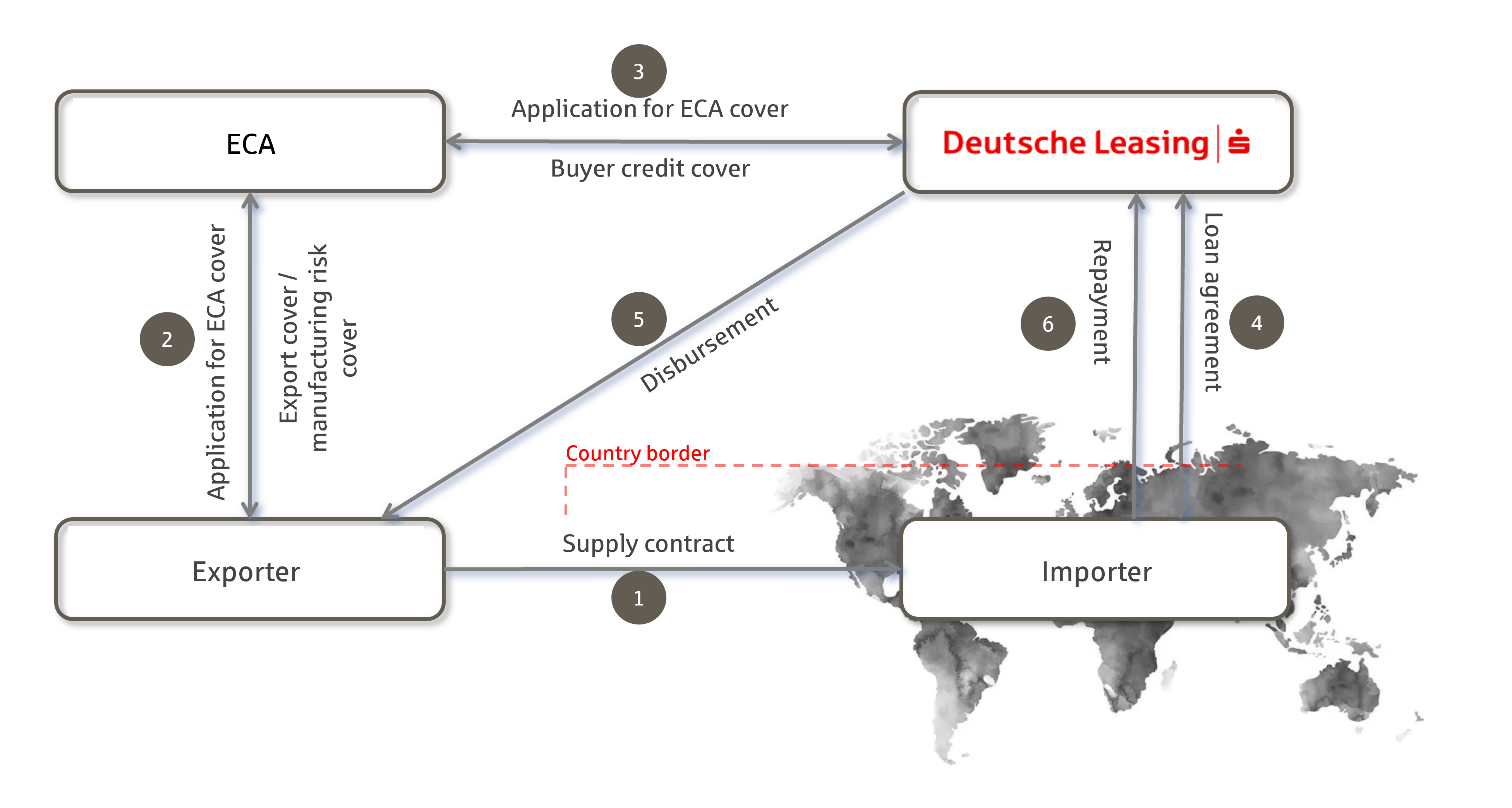Investments abroad: Export financing with ECA cover
What does ECA mean?
ECA stands for Export Credit Agency and refers to an institution that promotes transactions on behalf of a state, especially in emerging and developing countries. This is made possible by assuming credit risks through credit default insurance. Credit default insurance primarily protects against the default of receivables and ensures secure payment flows. In times marked by significant uncertainties in both domestic and international business, this type of export financing offers SMEs a good opportunity to continue to conduct export business and secure it.
What risks does the ECA assume?
The ECA can be organised under private or public law. In Germany, Euler Hermes Aktiengesellschaft is the mandatary, the authorised representative of the state, so to speak. Also known as the "Euler Hermes Bund", the ECA is responsible for implementing the cover instruments used to hedge the default risk in export transactions. It primarily covers political risks, such as warlike events or the impairment of interstate payment transactions. In addition, commercial risks such as payment default or the insolvency of an importer are also insured. The indemnity amount is made up of the outstanding monetary claims of the credit amount and the ancillary financing costs (e.g. "Hermes premium"). The German ECA, for example, bears 95 per cent of the risks, provided that all requirements for ECA cover are met.
What are the basic requirements for this type of export financing?
The basic prerequisite for export financing with ECA cover is the supply contract. The exporter concludes a supply contract with its foreign importer — including services if necessary. In addition, the importer and exporter agree that part of the order value is to be financed. It is therefore advisable for the exporter to contact Deutsche Leasing directly during the offer phase and request an ECA financing offer.
Who is the ECA offer aimed at and are smaller financing amounts also covered?
In the 22 countries in which Deutsche Leasing is represented by a branch, financing is provided independently by Deutsche Leasing from a credit volume of EUR 2.5 million. In these markets, it can draw on the many years of experience and expertise of its local colleagues - also with regard to export financing. In addition, there are country limits in other countries that enable independent financing by Deutsche Leasing. SME customers in particular benefit from this, as in the past ECA transactions were often only offered for significantly larger volumes.
"SmaTiX" - Small-Ticket Express: digital solution for small-volume financing
Thanks to a cooperation between Deutsche Leasing and AKA Bank, export-oriented customers of Deutsche Leasing and the savings banks benefit from direct access to the AKA online portal "SmaTiX" (Small Ticket Express) for ECA-covered buyer credits in the amount of 850,000 to 15 million euros or USD. Financing requests for more than 80 importing countries can be generated using SmaTiX in an efficient and accelerated digital application process. The predominantly SME export customers of the savings banks and Deutsche Leasing can thus access solutions for export financing that are only supported by a few providers in the German-speaking banking sector.
What criteria must be met for this form of export financing?
The requirements for ECA-covered export financing include:
What is the intended duration of ECA-covered financing?
The main advantage of export financing with ECA cover is its long-term nature, which allows the borrower to plan ahead financially. The maximum term is specified by the state credit insurer. As a result of the changes to the OECD consensus, terms of up to 15 years are now possible, and even up to 22 years in the case of sustainable financing. Repayment is usually made in equal half-yearly instalments. The start of repayment is determined by the delivery and/or service period agreed in the export contract. It begins six months after the starting point defined in the loan agreement. Payment is usually made to the exporter after the exporter has submitted call-offs documenting the deliveries made or services rendered.
Does the offer also apply to investments by SMEs in European countries?
Historically, enquiries regarding ECA-backed export financing primarily focused on emerging and developing markets where private insurance coverage is often unavailable. However, there has been a growing number of enquiries from European countries, where ECA cover is also applicable. In light of current uncertainties, this instrument provides a valuable means of mitigating risks and facilitating international transactions.
